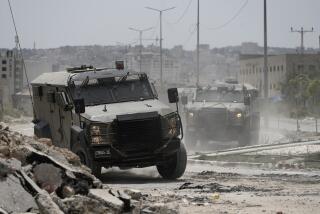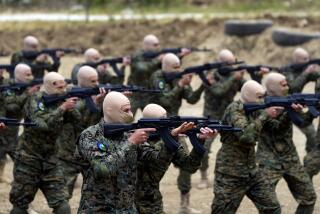Islamic Jihad Admits Role in Blast
- Share via
JERUSALEM — The radical movement Islamic Jihad on Saturday claimed responsibility for Friday’s bombing at a crowded Jerusalem market and threatened new attacks aimed at wrecking a Middle East peace deal already foundering two weeks after it was signed.
The bombing, a botched operation that injured about two dozen Israelis but didn’t kill anyone besides the two Palestinians transporting the explosives, threw the recently revived Middle East peace process into disarray.
Israel’s government suspended indefinitely its debate over whether to approve the U.S.-brokered land-for-security agreement, and Cabinet ministers gave no indication Saturday that a date to reconvene had been set.
Israel is demanding that the Palestinian Authority wage “an all-out war” against extremists who kill and maim Israelis before it will move ahead on the peace plan, which it signed at a White House ceremony Oct. 23. The agreement requires Israel to hand over to the Palestinians an additional 13% of West Bank land.
Palestinian officials accused Israel of using delaying tactics. At the same time, however, they announced a fresh crackdown in the Palestinian-controlled cities of Bethlehem and Janin, both reputed centers for Islamic Jihad. Janin, about 40 miles north of Jerusalem, was also home to one of the two men who blew themselves up in Friday’s blast.
Numerous Jihad sympathizers were arrested in a series of raids Friday night and Saturday, a senior aide to Palestinian Authority President Yasser Arafat said. He and several security officials declined to reveal the number of detainees, however.
Among the targets was a nursery school run by a well-known Palestinian activist, Itaf Alayan, that was shut down because of what Palestinian Authority officials say are the woman’s ties to Islamic Jihad.
Ramadan Abdullah Shallah, the Damascus, Syria-based head of Islamic Jihad, said Saturday in an Arabic-language radio broadcast monitored in Gaza City that the market attack was carried out by two “sons of Islamic Jihad” who are now “martyrs” for the movement.
In similar terms, a leaflet faxed to news organizations also purported to claim responsibility for the bombing on behalf of Islamic Jihad, a small and secretive organization that has been relatively inactive since its founder was assassinated in October 1995.
The leaflet hailed the “heroic martyrdom” of the two dead men, condemned the “repressive campaign” carried out by Arafat and vowed to repeat attacks aimed at stopping the so-called Wye agreement, reached last month in Maryland.
Another, larger Islamic militant movement, Hamas, has already been subjected to the arrests of scores of its followers. Arafat’s security services launched that campaign after an Oct. 29 car bombing targeted a bus full of schoolchildren. The spiritual leader of Hamas, Sheik Ahmed Yassin, is under house arrest.
For all its disastrous political impact, however, Friday’s bombing was portrayed by Israeli security officers as the work of amateurs. Recent attacks have failed to claim large numbers of victims, in what Israeli authorities say is a sign of better security and less-competent terrorists.
Israeli specialists and some Palestinians say that militant groups such as Hamas and possibly Islamic Jihad have been forced to reduce the area and scope of their military operations after crackdowns by security forces on both sides.
Israeli authorities point to good intelligence and relentless vigilance that have enabled them to make arrests, block the transport of explosives and thwart specific attacks. They also cite sheer luck. In addition, Palestinian security forces, receiving training from the CIA, have cooperated with the Israelis in some terrorism cases.
And several senior Hamas and Islamic Jihad leaders, and the groups’ best bomb makers, have been killed in the last three years.
Some analysts suggest that Islamic militants have deliberately limited the deadliness of their operations because smaller attacks create sufficient political damage to the peace process without the fallout that multiple fatalities cause.
In the case of Islamic Jihad, it is believed that the group has not single-handedly staged a major attack since its founder and leader, Fathi Shikaki, was shot to death in Malta in 1995. Shallah and other current leaders are ideologues who lack the operational expertise of Shikaki, under whose command Islamic Jihad killed 37 Israelis and wounded scores more in the first two years after the 1993 Oslo accords.
Hamas is held responsible for the killings of at least 76 people and the wounding of 350 in eight attacks in 1994 and 1995. Terrorist attacks killed 106 people in 1996 and 1997 and have claimed 10 lives so far this year.
More to Read
Sign up for Essential California
The most important California stories and recommendations in your inbox every morning.
You may occasionally receive promotional content from the Los Angeles Times.














